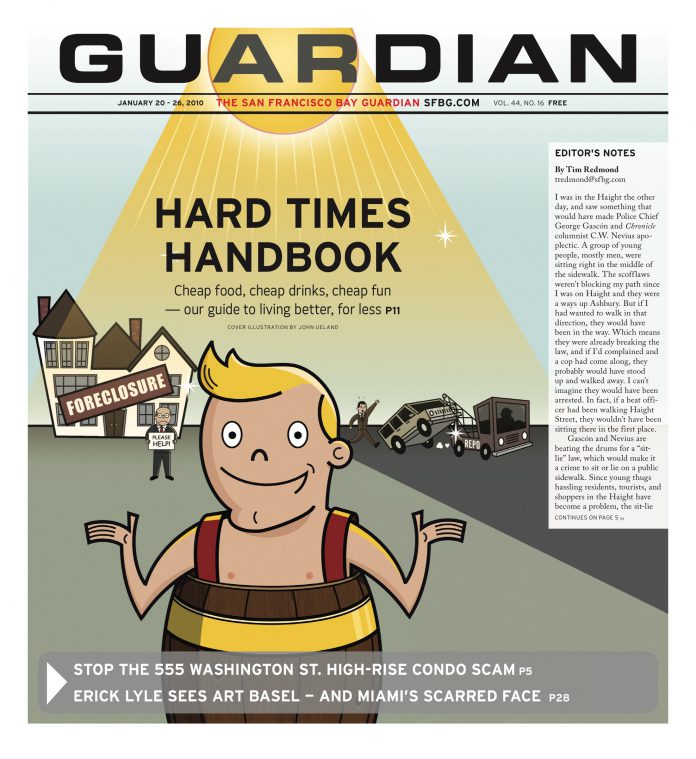FILM Hollywood always exploits the space between plausibility and fantasy, but rarely with such fluidity as in the films of the 1940s and ’50s. Some of the era’s darkest refractions of the disquieted American belong to Jerry Lewis, but generally we look to film noir for the cynical postwar imagination.
The canon is not nearly so settled as some might imagine, and San Francisco’s Eddie Muller has done as much anybody to reinvigorate this American trust. His enterprising archival work and affable showmanship have turned the San Francisco Film Noir Festival into that rarest bird in repertory programming: a sure thing. Over the course of a week jammed with 12 double-features, Noir City furnishes a utopic movie universe where the Castro Theatre is always packed and the credits of unsung Hollywood talents like screenwriter Bill Bowers and cinematographer James Wong Howe win spontaneous applause. This year’s theme, “Lust and Larceny,” is sufficiently baggy to accommodate a wide range of rarities, but my early pick is for the one-eyed André de Toth’s Pitfall (1948), a despairing adultery tale that makes serious sport of the fault-lines running through the suburban family unit.
Fortuitously, the Noir City festival opens the same night as a Pacific Film Archive retrospective of producer Val Lewton’s seminal B movies. The 10 films unspooling during January and February date from the same war-frayed years that the noir mood came into its own, and in many ways the Lewton films are the flipside of Noir City’s disillusionment. Instead of the pathology of everyday life, here we have intensely relatable nightmares. In Kent Jones’ 2007 documentary portrait, Val Lewton: The Man in Shadows, a visibly moved Kiyoshi Kurosawa speaks of Lewton’s films bearing the hermetic mark of works made in rapid succession, when inspiration burns brightest.
It is surely one of the great ironies of American film history that RKO’s front office brought on Lewton’s unit to jettison Orson Welles’ long shadow. Boasting dunderheaded populism (“Showmanship in Place of Genius”), they ended up with another great artist. Everything that makes Lewton’s legacy comparatively minor has, paradoxically, made him the more fiercely prized auteur in cinephile circles. James Agee pitched him as one of the three preeminent creative minds in Hollywood, but Lewton still belongs to Manny Farber. One can sense the recently canonized critic honing his taste for lateral movement, character actors, weird symbols, and the effectively out-of-joint in his early writings on Lewton’s unlikely perfection.
As many have remarked, the Russian-born producer’s strategic acceptance of budget constraints purchased a unique degree of creative freedom and formal consistency. And yet, however exact the films’ realization, the melancholy that sets women on slow promenades and objects to mysterious life verges on unbounded irrationalism. The conventional take on Lewton — that he worked tight budgets to his advantage by pressing shadows and sounds to suggestive heights, in stark contrast to Universal’s corny monsters — is right as far as it goes, but the films’ dark tidings cannot be put down to economy. Invisibility always operates on several levels in a Lewton film. Most basically, the inspired chills slaking horror’s thirst do not resolve in the proper genre manner, but rather twist towards deeper, irrevocable anguish.
But what exquisite torment! In spite of the morose overtones — and it’s difficult to think of another Hollywood oeuvre from this period so contently in the grip of death — there is something ecstatic in the films’ animistic apprehension. The violent sway of a ship’s hook, a rustling branch, a voodoo doll, a pool, and a whole world of echo: these things have a talismanic significance that can help explain why Lewton’s cinema simultaneously seems so cluttered and withholding, compressed, and lingering — in a word, loving.
SAN FRANCISCO FILM NOIR FESTIVAL
Jan 22–31, $10
Castro Theatre
429 Castro, SF
“COMPLICATED SHADOWS: THE FILMS OF VAL LEWTON”
Jan. 22–Feb 13, $5.50–$9.50
Pacific Film Archive, 2575 Bancroft, Berk
(510) 642-5249

